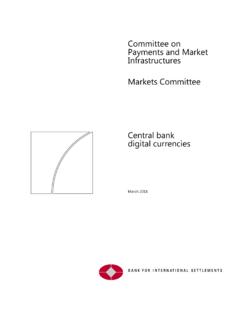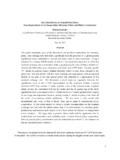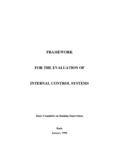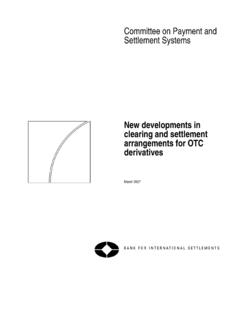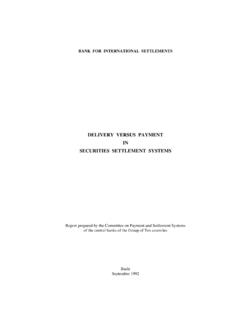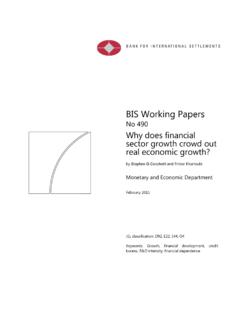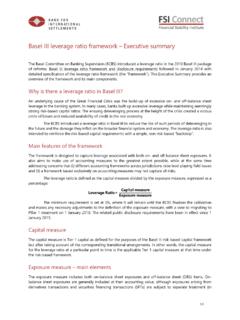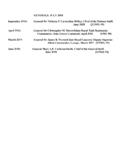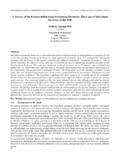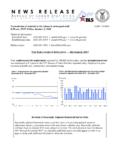Transcription of The role of central banks in macroeconomic and financial ...
1 BIS Papers No 76 The role of central banks in macroeconomic and financial stability Edited by M S Mohanty Monetary and Economic Department february 2014 The views expressed are those of the authors and not necessarily the views of the BIS. This publication is available on the BIS website ( ). bank for International Settlements 2014 . All rights reserved. Brief excerpts may be reproduced or translated provided the source is stated. ISSN 1609-0381 (print) ISBN 92-9131-972-4 (print) ISSN 1682-7651 (online) ISBN 92-9197-972-4 (online) BIS Papers No 76 iii Contents The role of central banks in macroeconomic and financial stability Jaime Caruana.
2 1 Speech by Paul Collier .. 7 financial integration in Africa: implications for monetary policy and financial stability Benedicte Vibe Christensen .. 11 Government debt issuance: issues for central banks Stephen Vajs .. 29 financial stability objectives and arrangements what s new? Serge Jeanneau .. 47 Macroprudential policies, commodity prices and capital inflows Paul Masson .. 59 Government debt issuance and central banks Kenya s experience central bank of Kenya .. 77 Cross-border expansion of Nigerian banks : has it improved the continent s regulatory and supervisory frameworks?
3 Sarah O. Alade .. 83 List of participants .. 97 BIS Papers No 76 1 The role of central banks in macroeconomic and financial stability Jaime Caruana Introduction central banks in Africa are changing as the continent becomes increasingly integrated with the global financial system. Four important challenges were analysed at this meeting. 1. The recent surge in pan-African banking is driving a new wave of financial integration. This has many benefits for the region, but confronts central banks and supervisors with new challenges in monitoring and managing risks.
4 2. central banks have a key role in developing local debt markets. The development of local currency bond markets is critical to Africa s financial development and resilience to shocks. Government fiscal and debt management policies should not undermine effective monetary policy. Good macroeconomic policy requires mechanisms that ensure appropriate coordination but avoid potential conflicts of interest. 3. financial stability frameworks need to be strengthened.
5 central banks must have a major voice in financial stability policy which is closely linked with monetary policy. central banks are naturally the official institution closest to financial markets. Nevertheless, responsibility for financial stability will almost always be shared with other bodies. How this is done will differ from country to country. But, however done, supervisors need the independence and the powers to act quickly and impartially. 4. The prolonged period of higher-than-average commodity prices, often attracting heavy capital inflows, has boosted growth but may also have created its own financial stability risks.
6 In this context, a macroprudential perspective to policymaking one that attempts to look through these long swings of commodity prices can help to address systemic threats. This meeting allowed central banks from different continents to compare notes on their experiences in dealing with such challenges. Nevertheless, each country has its own special context. Paul Collier urged policymakers to focus on Africa s distinct problems and to take account of their own situation. They need, he said, to modernise Africa s financial system to enhance investment and growth opportunities, and to develop robust institutions and rules for managing Africa s natural resources to their best advantage.
7 2 BIS Papers No 76 1. financial integration in Africa: implications for monetary policy and financial stability Over the past five years, cross-border capital flows into Africa have been driven up both by easy global monetary conditions and by the continent s own improved macroeconomic performance. As banks in advanced economies shed assets and risks, a greater share of cross-border bank flows into Africa has come from banks domiciled in major EMEs such as Brazil, China and India. Another new development, discussed in the paper by Benedicte Christensen in this volume, is the spread of pan-African banking groups (those domiciled in Africa with subsidiaries in several African countries).
8 Pan-African banks typically bring expertise and competition to the host country, improving the functioning of interbank and foreign exchange markets and broadening access to banking services. At the same time, host country supervisors are well aware of the new financial stability risks that could arise from the global operations of these banks . To deal with such risks and monitor them, improvements in the regulatory and supervisory framework are required. They need more timely information about the health of foreign banks .
9 Host supervisors also face the challenge of devising appropriate cross-border contingency plans for winding down unviable or failed banks . Moral hazard issues need to be carefully taken into account when designing the lender-of-last-resort assistance to pan-African banks . The paper by Sarah Alade, Deputy Governor of the central bank of Nigeria, notes the challenges from the home country perspective. The rapid growth in the operations of Nigerian banks in the rest of Africa has prompted the central bank to introduce a new regulatory and supervisory system.
10 Deputy Governor Alade highlights two basic aspects of supervision: first, all foreign banks should be subject to supervision and, second, supervision should be consistent with international standards. In addition, all foreign operations of domestic banks must be brought under consolidated supervision. She notes that in Nigeria all banks whether domestic and foreign are treated equally and supervised under a uniform framework. In the event of a liquidity crisis, the central bank is the lender of last resort to all banks operating in Nigeria.
